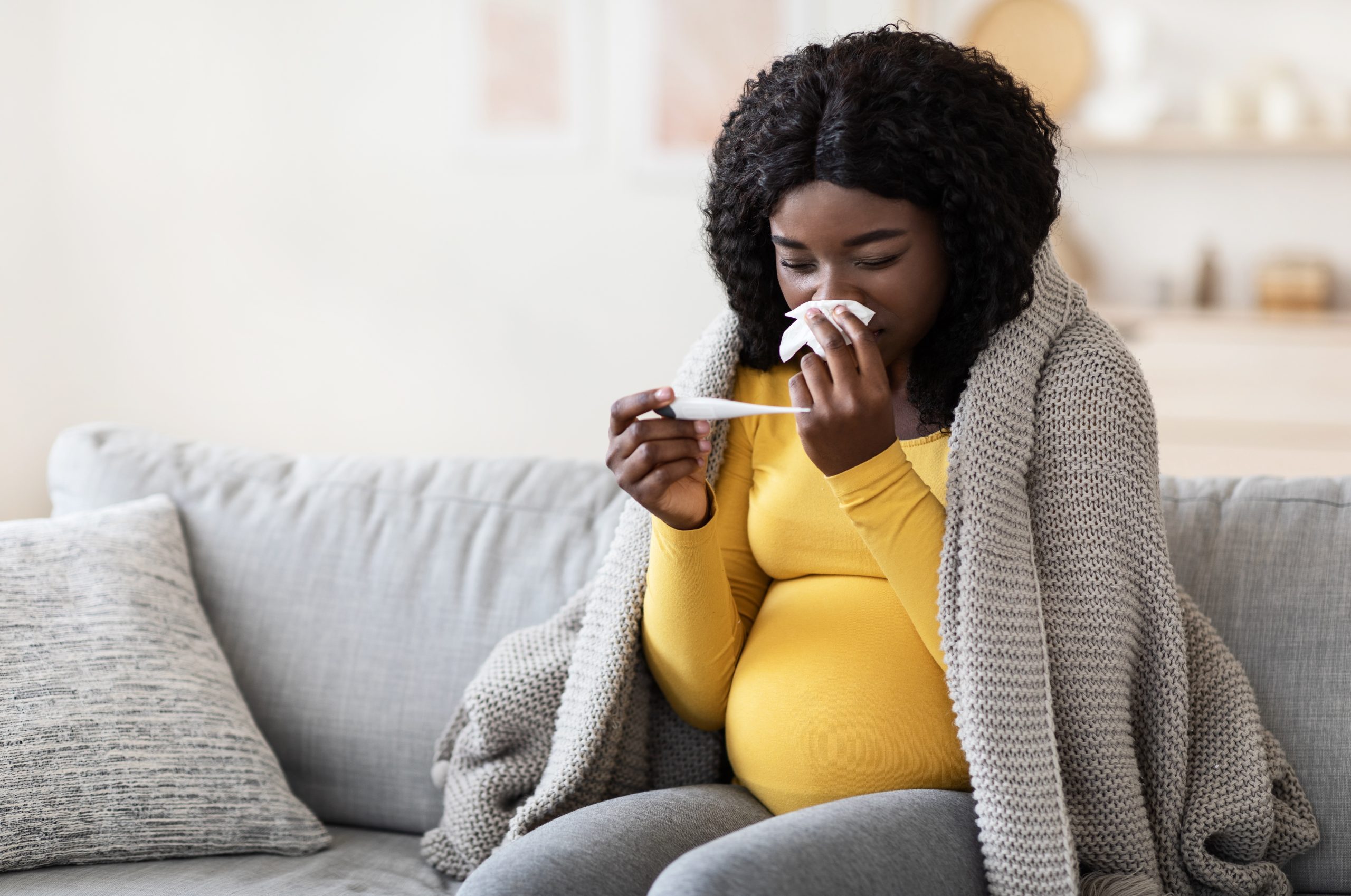RSV, Flu & COVID: Winter Respiratory Virus Guide for Canadian Parents and Babies
RSV, Flu & COVID: What Canadian Parents-to-Be Should Know for Winter 2024–2025
(Pregnancy Edition)
Pregnancy during the fall and winter months brings its own set of concerns—and this year, as we head into the 2024–25 respiratory virus season in Canada, there’s extra reason for expectant parents to be prepared. Three key viruses—Influenza (the “flu”), COVID‑19 and Respiratory syncytial virus (RSV)—are circulating, and while many people will have mild illness, pregnant individuals and newborns are among the higher-risk groups.
This article breaks down what you need to know—why each virus matters, what’s new this season in Canada, and practical strategies you can use now (and through the holidays) to protect yourself and your baby.

Why this season matters for pregnancy
A triple‑viral challenge
In colder months, people spend more time indoors, viral spread tends to increase, and health systems can get busy. Public health agencies are already reminding Canadians of the coming “respiratory season,” including flu, COVID‑19 and RSV. For pregnant people, the stakes are higher: changes in immune and cardiopulmonary function can increase the risk of complications from respiratory viruses.
What’s new or different this year
- The National Advisory Committee on Immunization (NACI) in Canada recommends the seasonal flu vaccine for all individuals 6 months and older, including pregnant people. See guidance at Canada.ca.
- Guidance for flu and COVID‑19 immunization has been updated in several provinces for the 2024–25 season. See updates via Public Health Ontario (and your local public health unit).
- Although RSV is often associated with babies and young children, it also matters in pregnancy: by protecting the baby via maternal antibodies, you reduce the risk of severe RSV in the early months after birth. Learn more at immunize.ca.
- For pregnant people and new parents, now’s a good time to revisit seasonal health plans: vaccinations, preventive behaviours, and post‑baby care.
The three viruses—quick overview
| Virus | Why it matters in pregnancy/newborns | Key facts |
|---|---|---|
| Flu (Influenza) | Pregnant people who catch the flu have higher risk of hospitalization, complications and preterm delivery. Newborns cannot get the flu vaccine until 6 months old. | The 2024–25 flu vaccine is recommended for those 6 months+ in Canada. Pregnant people are in the “special risk” group. Source: Canada.ca. |
| COVID‑19 | Vaccines and treatments have reduced worst‑case outcomes, but COVID‑19 still poses risk of severe illness in pregnancy and is associated with adverse outcomes (e.g., preterm birth). | COVID‑19 activity often rises in colder months. Monitor local guidance. See Public Health Ontario. |
| RSV (Respiratory Syncytial Virus) | RSV is a leading cause of severe lower‑respiratory illness in infants. Protecting mom helps protect baby after birth via maternal antibodies. | RSV is seasonal in Canada (fall/winter). Resources: immunize.ca. |

What you can do as an expectant parent
1. Vaccinations: stay up‑to‑date and speak with your provider
- Flu vaccine: Strongly recommended during pregnancy (any trimester). Helps protect both you and your baby. See NACI guidance at Canada.ca.
- COVID‑19 vaccine/booster: Discuss timing with your provider—depends on your health status, prior doses, and local recommendations.
- RSV protection: Availability of RSV options for pregnancy varies by region and over time; ask your provider and local public health for the latest guidance.
Ask specifically: “What vaccines do I and my baby need this winter?” and “Should I time this vaccine now before the holidays/travel/gatherings?”
2. Preventive habits—especially important during pregnancy
- Stay home if you’re feeling unwell; limit close contact with people who are sick. See Canada.ca.
- Wash hands frequently and properly (especially after being in public places).
- Encourage household contacts to be vaccinated too—this “cocooning” strategy helps protect you and baby.
- Avoid large indoor gatherings if you’re feeling vulnerable or in late pregnancy, especially during peak viral season.
- Maintain general health: rest, eat well, manage stress, stay active per your pregnancy plan, and keep prenatal appointments.
- For holidays or visitors, favour well‑ventilated spaces or outdoor options when possible.
3. Planning for newborn safety
- Newborns cannot be vaccinated for flu until 6 months old—their best protection comes from you (maternal antibodies) and household health behaviours.
- Set expectations for visitors: ask guests who are unwell to wait; ask everyone to wash hands; consider masking around baby in the early weeks.
- Build your postpartum plan with respiratory season in mind: line up newborn check‑ups, know signs of respiratory distress (rapid breathing, wheezing, feeding difficulties) and when to seek care.

4. Holiday and winter‑specific strategies
- With gatherings and travel, risk of viral spread increases. Try to schedule vaccination early (October/November) so immunity is established before peak season.
- If you’re in your third trimester over the holidays, consider limiting exposure to large groups or requiring masks if someone is unvaccinated or ill.
- Keep backup plans: prenatal vitamins, backup childcare for siblings, and an updated list of emergency contacts and symptom guidelines from your provider.
Addressing myths & questions
“I had the flu vaccine last year—do I still need it now?”
Yes. Flu viruses change each year, and the vaccine is updated to match circulating strains. Being pregnant doesn’t exempt you—vaccination helps protect both you and your baby.
“I feel fine, so I don’t need the COVID‑19 booster.”
Even if you’re healthy now, pregnancy changes your immune system. Vaccination lowers the risk of severe illness and may benefit your baby. Talk to your provider about timing and eligibility.
“RSV only affects babies—why does it matter for me now?”
RSV mostly affects infants and young children severely, but by protecting yourself and reducing exposure around the time of birth, you help lower the risk of serious RSV in your baby’s early weeks.

Bonus tip list (save this!)
- ✔ Schedule trimester visits and ask: “Which vaccines should I book now for winter?”
- ✔ Add calendar reminders for flu shot, COVID‑19 booster check and winter health check‑in.
- ✔ Encourage partners/household to vaccinate too.
- ✔ Create a simple visitor‑health checklist for when you bring baby home (or for hospital visits).
- ✔ Choose one “safe visit” strategy per month (online, outdoor, well‑ventilated indoor) when possible.
- ✔ Keep a winter essentials kit: hand sanitizer, a mask, thermometer, and your provider’s contact info.
Final word
Being pregnant in Canada during the 2024–25 respiratory season means taking a few extra smart steps—but it doesn’t have to be stressful. With the right vaccinations, healthy habits, and a bit of winter planning, you can feel confident that you’re protecting both you and your baby. Enjoy the season, get your snowsuit ready, and know you’re prepared.
Remember: this article is informational. Always consult your healthcare provider for personalized advice and vaccine recommendations.
Helpful reads
- Looking for free baby samples in Canada? Don’t miss our always‑updated master list of freebies.
- Building your baby registry? Here’s how to create a smart, budget‑friendly one without overspending. (Coming soon)
- Want chances to win baby gear? Browse current Canadian baby contests and giveaways.
Frequently Asked Questions: RSV, Flu & COVID in Canada
What’s the difference between RSV, flu, and COVID symptoms?
RSV, influenza (flu), and COVID-19 are all respiratory viruses, and their symptoms can overlap, especially in young children and pregnant people.
-
RSV often causes cold-like symptoms but can lead to more serious breathing issues in infants, including wheezing, rapid breathing, and difficulty feeding.
-
Flu typically causes sudden fever, chills, body aches, fatigue, cough, and sore throat.
-
COVID-19 symptoms vary widely and may include fever, cough, sore throat, congestion, headache, fatigue, or gastrointestinal symptoms.
In babies and young children, symptoms can be harder to distinguish. If a baby shows signs of breathing difficulty, dehydration, or extreme lethargy, medical care should be sought promptly.
Can newborns get vaccinated for RSV, flu, or COVID?
In Canada, newborns cannot receive flu or COVID-19 vaccines immediately after birth. These vaccines are typically recommended starting at 6 months of age, depending on current public health guidance.
For RSV, protection may be offered in other ways:
-
Some infants may be eligible for RSV antibody protection (a monoclonal antibody) to help prevent severe illness.
-
In some cases, maternal vaccination during pregnancy may help protect newborns through transferred antibodies.
Parents should discuss RSV protection options with their healthcare provider, as eligibility and recommendations may vary.
Do pregnant people need flu, COVID, and RSV vaccines?
Pregnant people in Canada are commonly recommended to receive the seasonal flu vaccine and COVID-19 vaccine or booster, as pregnancy increases the risk of severe illness from respiratory infections.
RSV prevention options during pregnancy may also be discussed with a healthcare provider. The goal is to protect both the pregnant person and the baby, particularly during the first months of life when infants are most vulnerable.
Always consult a healthcare provider to determine which vaccines or preventive measures are appropriate based on timing, health history, and current public health recommendations.
How long is RSV season in Canada?
RSV season in Canada typically occurs during the late fall through early spring, often overlapping with flu and COVID-19 season. The exact timing and intensity can vary by year and by region.
Public health agencies monitor RSV activity throughout the season, and parents may see increases in cases during colder months when people spend more time indoors.
When should parents seek medical care for respiratory symptoms in babies?
Parents should seek medical attention if a baby or young child shows any of the following symptoms:
-
Rapid or laboured breathing
-
Wheezing or persistent coughing
-
Bluish lips or skin
-
Difficulty feeding or signs of dehydration
-
Extreme sleepiness or difficulty waking
-
Fever in infants under 3 months
Trust your instincts — if something doesn’t seem right, it’s always appropriate to contact a healthcare provider.
How can parents reduce the risk of RSV, flu, and COVID at home?
While it’s not possible to eliminate risk entirely, families can reduce the spread of respiratory viruses by:
-
Washing hands frequently
-
Avoiding close contact with sick individuals
-
Cleaning high-touch surfaces regularly
-
Keeping babies away from crowded indoor spaces when possible
-
Staying up to date with recommended vaccines
These steps help protect both parents and children during respiratory virus season.
This post is also available in: Français (French)